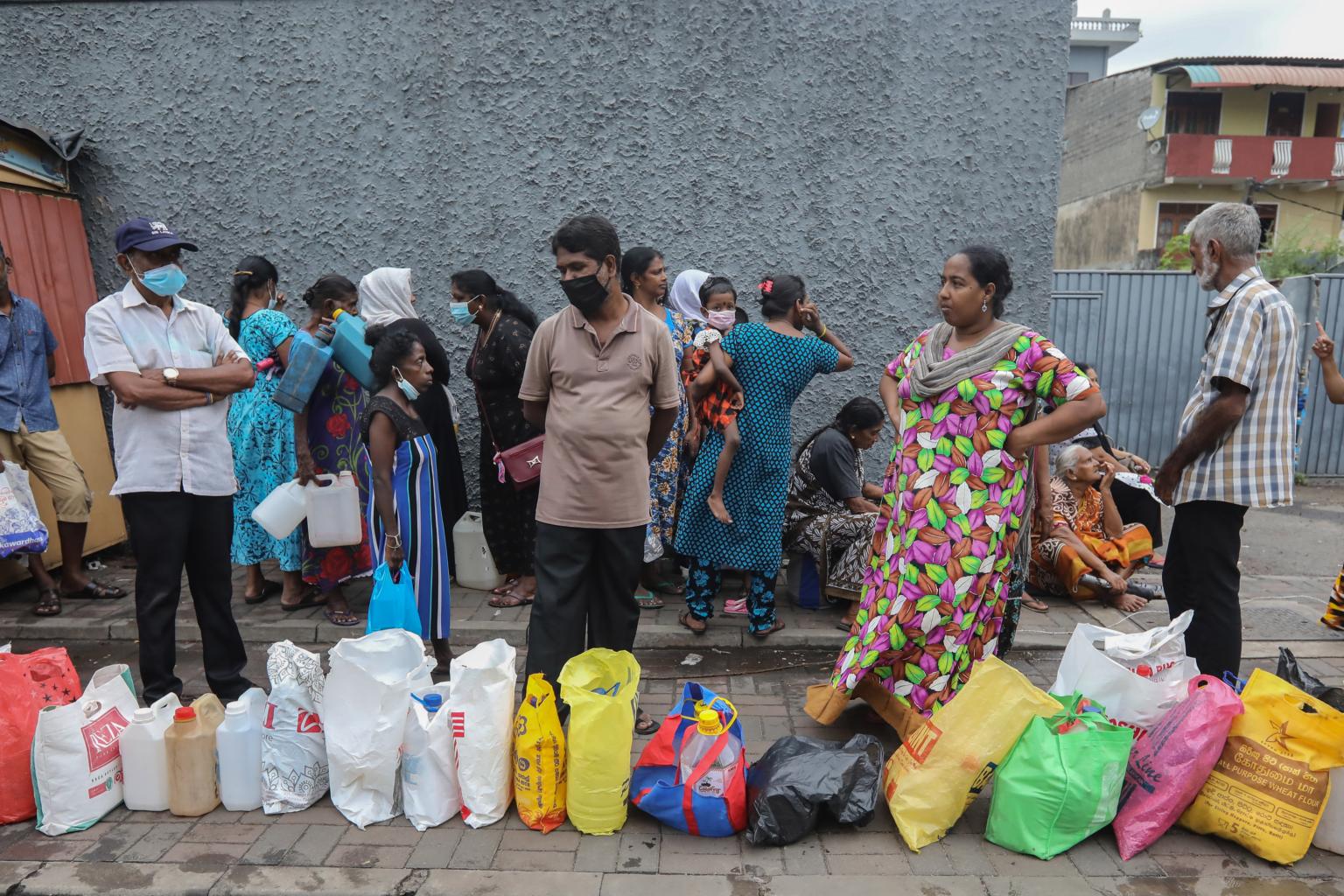Cash-strapped Sri Lanka gets Russian oil to ease shortages
Sign up now: Get insights on Asia's fast-moving developments

People waiting to buy fuel at a gas station in Colombo on May 24, 2022.
PHOTO: EPA-EFE
COLOMBO (AFP) - Cash-strapped Sri Lanka took delivery on Saturday (May 28) of Russian oil - which could soon be subject to a European embargo - to restart operations at the country's only refinery, the energy minister said.
Sri Lanka will pay $72.6 million to buy the 90,000-tonne shipment of Russian oil that has been docked at Colombo’s port for weeks, its energy minister said on on Saturday, as the island nation works to restart its only refinery and address a crippling energy crisis.
The island nation is suffering its worst economic meltdown since independence from Britain in 1948, with shortages of fuel and other vital goods making life miserable for its 22 million people.
The state-run Ceylon Petroleum Corporation (CPC) refinery was shuttered in March in the wake of Sri Lanka's foreign exchange crunch, which left the government unable to finance crude imports.
The Russian crude delivery had been waiting offshore of the capital Colombo's port for over a month as the country was unable to raise US$72.6 million to pay for it, energy minister Kanchana Wijesekera said.
Colombo is also in talks with Moscow to arrange direct supplies of crude, coal, diesel and petrol despite US-led sanctions on Russian banks and a diplomatic outcry over Russia's invasion of Ukraine.
"I have made an official request to the Russian ambassador for direct supplies of Russian oil," Mr Wijesekera told reporters in Colombo.
"Crude alone will not fulfil our requirement, we need other refined (petroleum) products as well."
Around 90,000 tonnes of Siberian light crude will be sent to Sri Lanka's refinery after the shipment was acquired on credit from Dubai-based intermediary Coral Energy.
Mr Wijesekera said CPC was already in arrears of US$735 million to suppliers and no one came forward to even bid for its oil tenders.
He added that the Siberian grade was not an ideal match for the refinery, which is optimised for Iranian light crude, but no other supplier was willing to extend credit.
Sri Lanka will nonetheless call for fresh supply tenders in two weeks before the stock of Siberian light runs out, Mr Wijesekera said.
The Sapugaskanda refinery on Colombo's outskirts will resume work in about two days.
European Union leaders are meeting on Monday in an effort to negotiate a fresh round of sanctions against Russia over the Ukraine conflict, including an oil embargo.
Russian oil is already subject to a US embargo and its barrels have traded at a steep discount from international benchmarks, which have risen substantially since the conflict began.
Like the rest of Asia, Sri Lanka wants to shift to long-term crude tenders to hedge against high crude spot prices, but dwindling foreign exchange reserves have hampered its ambitions, the power minister said.
“I have reached out to multiple countries, including Russia, for support to import crude and other petroleum products,” Mr Wijesekera told reporters.
The 90,000-tonne consignment was ordered through Dubai-based Coral Energy, Wijesekera said, adding that the payment would facilitate restarting the country’s sole refinery, which has been closed since March 25.
“The next shipment will also be ordered from the same company. Another consignment will be needed within the next two weeks to keep the refinery running continuously,” Mr Wijesekera said.
Queues of two-wheelers and cars outside fuel stations, sometimes miles long, have become a familiar sight for Sri Lankans this year, with high global oil prices exacerbating their misery.
Mr Wijesekera estimates that Sri Lanka will need US$568 million to pay for a dozen fuel shipments needed in June.
The country is struggling to pay US$31 million for a furnace oil shipment docked at Colombo’s port. State-run Ceylon Petroleum Corporation (CPC) needs US$735 million to clear letters of credit for previous oil purchases.
Total foreign reserves were US$1.82 billion at the end of April.
Protests have rocked Sri Lanka in recent days, with demonstrators demanding the resignation of President Gotabaya Rajapaksa over the financial crisis.
“I have reached out to multiple countries, including Russia, for support to import crude and other petroleum products,” Mr Wijesekera told reporters.
The 90,000-tonne consignment was ordered through Dubai-based Coral Energy, Wijesekera said, adding that the payment would facilitate restarting the country’s sole refinery, which has been closed since March 25.
“The next shipment will also be ordered from the same company. Another consignment will be needed within the next two weeks to keep the refinery running continuously,” Mr Wijesekera said.
Queues of two-wheelers and cars outside fuel stations, sometimes miles long, have become a familiar sight for Sri Lankans this year, with high global oil prices exacerbating their misery.
Mr Wijesekera estimates that Sri Lanka will need US$568 million to pay for a dozen fuel shipments needed in June.
The country is struggling to pay US$31 million for a furnace oil shipment docked at Colombo’s port. State-run Ceylon Petroleum Corporation (CPC) needs US$735 million to clear letters of credit for previous oil purchases.
Total foreign reserves were US$1.82 billion at the end of April.
Protests have rocked Sri Lanka in recent days, with demonstrators demanding the resignation of President Gotabaya Rajapaksa over the financial crisis.
Sri Lanka's economic crisis has seen long queues of motorists outside gas stations, waiting hours and sometimes even days for scant supplies of petrol and cooking gas.
Its people are also grappling with acute shortages of imported food and pharmaceuticals, along with record inflation and lengthy daily blackouts.
Anti-government protests erupted into riots earlier this month, leaving nine people dead and many more wounded.
A demonstration outside President Gotabaya Rajapaksa's office in Colombo demanding his resignation over the government's economic mismanagement entered its 50th day on Saturday.


